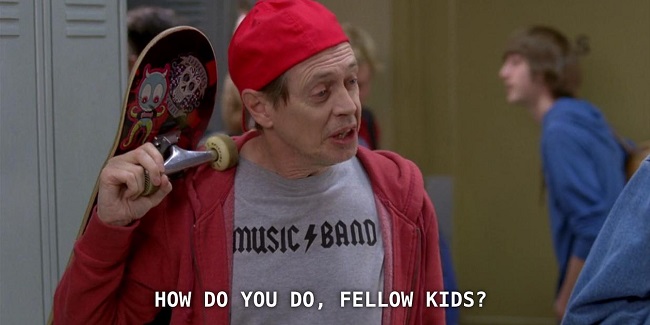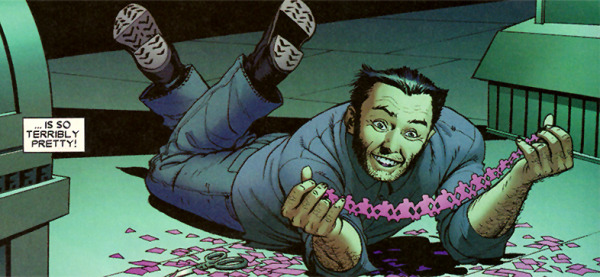
Eventually, even the most creative content marketer feels drained. We start thinking of content in commodity terms: If I fill this many buckets full of words, I will have justified my paycheck for today. We churn out content that adds to the mountain of commodity content, instead of writing engaging copy that flies above it.
If your content marketing team is exhibiting signs of burnout, it’s time to break out of the routine. Time for exercises that will bump everyone’s brain out of well-traveled grooves, while allowing for some fun as well.
Twice a month at TopRank Marketing, we have company-wide meetings where we learn new things, lift each other up, and play games that spark creative thinking.
(It’s pretty great. Did I mention we’re hiring?)
Here are 11 games that can spark new creativity in your content marketing team. Even if that team is just you.
#1: How Do You Do, Fellow Kids?
This game is about matching your tone to your audience. It uses purposefully bad writing to train good writing habits.
Take a piece of content from your brand—a blog post or social media message—and rewrite it directed at a specific audience. But your task it to be as bad at targeting that audience as possible. Try to make each other laugh. Really pile it on thick. Aim for this level of disconnect:

Writing copy that is purposefully awful for your target audience is a sneaky way of thinking about the best ways to reach them. Your brain gets the point, while you get to share hilarity with your team.
#2: Buyer’s Journey Storyboard
This game helps content marketers think about the buyer’s journey in a more specific, concrete way. We tend to ponder the hypothetical journey a lot, but this exercise helps ground that thinking and spark creative expression.
Have your team talk about the last time each person made a specific large purchase, like a car or signing an apartment lease. Work together to tell the story of reaching that purchase decision in 6-8 frames of a comic strip or storyboard.
This exercise distils the purchase process down to its essence, from a real-world model, and can help inform all manner of content creation.
#3: Fine Art Headlines
This game has two major functions: To think about using visuals in creative ways, and to think about how headlines inform the perception of a visual.
Take a trip to an art museum (or if that’s not in the budget, use Google Image Search and print out some classic art). Give each person a list of emotions to evoke with headlines that match the image. For example: fear, sadness, happiness, laughter, awwww, outrage…

Black is the New Black: Top Fashion for Mourners
Your team will stretch their creative muscles figuring out how to, say, evoke fear with a headline captioning the Mona Lisa. And they’ll be thinking of more creative ways to use visuals than overly literal stock photos.
#4: Aware Turtles
This game exercises the ability to speak persuasively regardless of the subject. It’s a skill that’s especially important for agencies with diverse clients, but also for marketers who feel stuck with a “boring” solution to market.
Use these random adjective and random noun generators to create two lists of ten. Each person picks a combination of adjective and noun from the lists, and has to market the resulting product to the team.
This game is good for getting laughs while thinking about what makes speech persuasive, and how the product is less important than the narrative marketers can create.
#5: Final Cut
This game helps sharpen awareness of sloppy writing. It helps the team think about how much you can pare down a message while retaining its essence.
Start with a film synopsis from Wikipedia, like this 700-word monstrosity from Batman V Superman. Ask your team to convey the same information in half the word count. Then half of that. Then half of that. See how few words are required to explain the film’s plot.
There is a visceral joy in whittling down someone else’s work that makes this exercise fun, while demonstrating how to write only what is essential.

*Review of “Jobs” Courtesy Haiku Movie Review
#6: Dead as a Cliché
This game highlights clichés that should be stricken from your team’s copywriting, while encouraging creative thinking to generate more colorful metaphors.
Give your team five minutes to brainstorm as many clichés as they can: Dead as a doornail; quiet as a mouse; sharp as a whip. Then assign each person one of the clichés and have them write as many new ways of communicating the idea as they can. Share each person’s results with the whole team.
Clichés are an enemy of expressive, personable writing. This exercise encourages more creative forms of expression that can better connect with readers.
#7: Headline Variations
This game helps your team think about the power of a headline, and how different headlines strike different tones and appeal to different audiences.
Start with the headline of one of your team’s recent blog posts (or other content). Have everyone suggest ways to rewrite the headline. For example:
- 11 Brain-Training Exercises for Your Content Marketing Team
- Train Your Content Marketing Team with these 11 Brainy Exercises
- 11 Creative Exercises to Train your Team
- Feeling Less Creative? These 11 Exercises Can Help
Then discuss the different headlines everyone generated. What feelings do each invoke? How do they attract or repel different audiences?
This exercise can help your team write better headlines, naturally. But it also serves to inspire more critical thinking about audience and tone that will more deeply inform content creation.
#8: Reverse Logic
This game helps your team find new buyer’s paths for your customers, which leads to more creative content strategy.
Work with your team to imagine the buyer’s journey for your ideal customer. But don’t start at the top of the funnel, with someone looking to solve a problem. Start with the purchase decision. What was the final thing that motivated the decision? Then take a step back and ask what motivated that decision. Keep going until you get all the way to the top.
Thinking about the process backwards frees your team from your established customer narrative. They may generate new ways to reach existing customers, or even identify a new audience.
#9: Superhero Problem-Solving
This game uses hyperbolic thinking to generate creative ideas to solve your team’s most pressing problems.
For this game, brainstorm a list of problems that is keeping your content marketing from being effective. Identify internal and external problems, from “We’re not properly attributing leads” to “Our customers are burned out on content.” Then generate a list of superheroes—Superman, Batman, Wonder Woman, Wolverine. Have your team match a superhero with a problem, and tell how the hero would use his or her superpowers to solve it.

Wolverine is an amazing problem solver.
Creating these little narratives is a good exercise in storytelling, and helps break out of conventional thinking to address a problem.
#10: Thinking outside the Spoon
This game is an exercise in pure creative thinking, a concrete example of a mindset that can apply throughout a content marketing team’s workday.
Divide your team into groups of 2-3 people. Give each group a common object, like a spoon or a refrigerator magnet. When we played the game, one object was a pink plush unicorn, which inspired much creative thinking. Ask each group to generate a list of all the different purposes the object can be used for that aren’t directly related to its primary purpose. Then have each team share their most creative ideas.
Since we played this game, our team frequently asks, “Is this just using a spoon as a spoon?” It’s become shorthand for “Are we pushing the boundaries of what’s possible, or getting lazy?”
#11: Movie Genre Swap
This game is about how word choice and tone influences the emotion that copy can evoke.
Divide into groups of 2-3. Have each group pick a movie and keep it secret, then write descriptions of the plot in different genres. Have each group present their synopses and let the rest of the team guess the movie.
For example, take The Wizard of Oz:
- Horror: A bloodthirsty menace drops out of the sky and murders an old woman, then teams up with a living doll, a cyborg, and a man-beast to kill again.
- Drama: A woman forced to emigrate against her will pines for her homeland against the backdrop of a nation in political upheaval. She must rely on unconventional friends to navigate this strange culture and appease the dictator who can grant her safe passage home.
- Action: A young woman goes on a quest for justice in a land that never belonged to her. She didn’t start this fight… but she has the heart, brains, and nerve to finish it.
This exercise is great for brain-stretching, as it requires completely altering the mood of a story while still keeping all the recognizable elements.
Exercise Your Creativity
In the words of Jay Acunzo, “Our jobs are not to be creative. Our jobs are to create.” Creativity is less some elusive state of mind and more a muscle that needs to be exercised to get stronger. These games can help get your team’s creative minds out of a slump, off of the metaphorical couch, and out on the jogging trail.
How do you exercise your team’s creativity? Let me know in the comments.
![]() Gain a competitive advantage by subscribing to the
Gain a competitive advantage by subscribing to the
TopRank® Online Marketing Newsletter.
© Online Marketing Blog - TopRank®, 2016. | 11 Brain-Training Exercises for Your Content Marketing Team | http://www.toprankblog.com
The post 11 Brain-Training Exercises for Your Content Marketing Team appeared first on Online Marketing Blog - TopRank®.
No comments:
Post a Comment